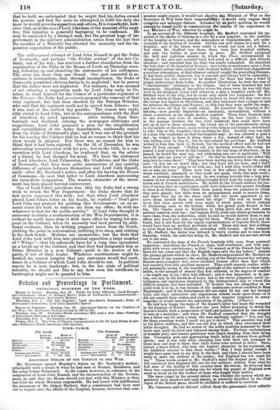The self-exposed attempt of Lord John Russell to get the
Duke of Newcastle, and perhaps "the Peelite section" of the late Ca- binet, out of his way, has received a further elucidation from the explanation of the Duke in the House of Lords on Thursday even- ing, following up and clenching the statements of his colleague& The story has more than one thread. One part consisted in as- sertions or insinuations, that, through incompetency, the Duke of Newcastle permitted obvious duties to be neglected: but he proves that the duties were not neglected. For instance, he was accused of not adopting a suggestion made by Lord John early in Oc- tober, to avail himself for the Crimea of a particular regiment at the Pincus : the Duke had previously proposed the removal of that very regiment, but had been checked by the Foreign Minister, who said that the regiment could not be spared from Athens ; but it was sent at the earliest day possible. The reason was expli- citly stated to Lord John, but in his correspondence with the Earl of Aberdeen he acted ignorance. After writing from Scar- borough and Scotland, echoing the newspaper criticisms and suggestions, Lord John proposed a plan for the simplification and consolidation of the Army departments, confessedly copied from the Duke of Richmond's plan ; and it was one of the grounds for his leaving the Cabinet that he had no reason to think that his view would be adopted. But there was no reason for him to think that it had been rejected. On the 3d of December, he was advocating reconstruction with his pen ; but on the 16th, in a con- versation with Lord Aberdeen, he confessed that, on the advice of a friend, he had changed his mind. We have the statement of Lord Aberdeen, Lord Palmerston, Mr. Gladstone, and the Duke of Newcastle, that they were quite unconscious of any existing difference of opinion between themselves and Lord John Russell, until—after Mr. Roebuck's notice, and after his leaving the House of Commons—he sent that letter to Lord Aberdeen announcing his immediate resignation. The wanton character of the move- ment has been placed beyond controversy.
One of Lord John's assertions was, that the Duke had a strong wish to retain the War Department : the Duke shows that he had never expressed this wish ; but that, when Lord Aberdeen placed Lord John's letter in his hands, he replied—" Don't give Lord John any pretext for quitting this Government: on no ac- count resist his wish to remove me from my office ; do with me whatever is best for the public service." If Lord John thought it necessary to obtain a reconstruction of the War Departments, it is evident he could have done it with more effect by urging his pro- posal in the Cabinet, when its necessity had been proved by addi- tional evidence, than by writing pungent notes from the North, yielding the point in conversation, suffering it to sleep, and retiring to the back bench. Motives are inscrutable ; but the facts that Lord John took with him into practical opposition a large number of " Whigs"—that his adherents have for a long time speculated on a break-up of the Cabinet, and that they had designated him as Prime Minister in a new Cabinet—point to the motive of his party, if not of their leader. Whatever combinations might be formed, we cannot imagine that any statesman would feel confi- dence in a Cabinet of which Lord John should be one. In political repute he is now bankrupt; but, in the lax state of political morality, we should not like to say how soon his certificate in bankruptcy might not be granted to him.


























 Previous page
Previous page